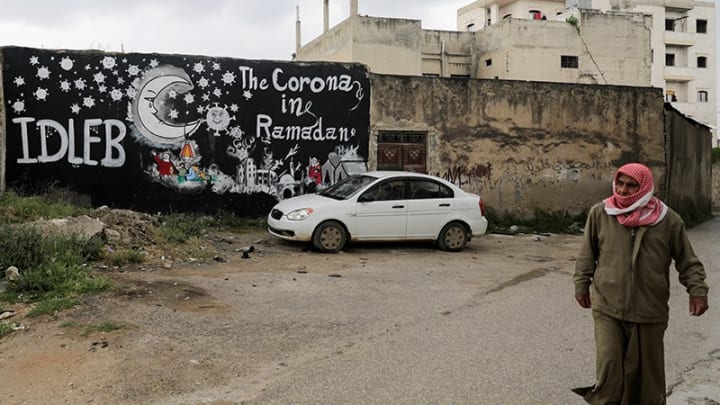
WASHINGTON — There have been no confirmed cases of COVID-19 in northwestern Syria, the last and shrinking stronghold of forces opposed to President Bashar Assad, but aid groups warn that it is only a matter of time until the coronavirus arrives — if it hasn’t already.
In Idlib province, an epicenter of one of the world’s most acute humanitarian crises, only 153 samples had been tested for the new coronavirus as of last week. While all of those tests came back negative, the province is surrounded by regions that have seen outbreaks already. In neighboring countries — and in parts of Syria controlled by the Assad government — authorities have instituted public health measures to limit the spread of the virus. In Idlib, where no such authority exists, that is proving difficult, if not impossible.
Iran, NKorea, Syria: How sanctions are hindering coronavirus response
Years of sanctions have impacted the ability of Iran, North Korea, and Syria to respond to the novel coronavirus outbreak. Experts tell us why.
A March 5 cease-fire, brokered by Turkey and Russia, has so far stemmed aerial bombardment, but it does not resolve the underlying conflict that could lead to renewed violence at any time.
“If the Syrian regime offensive resumes in earnest, the fate of more than 700,000 people now living in Idlib city will be in the immediate balance. While aid agencies must plan for the collapse of the ceasefire, they must also move quickly to prepare a highly vulnerable population for the inevitable arrival of COVID-19,” Sahar Atrache, senior advocate for the Middle East at Refugees International, wrote in a report published Tuesday.
Humanitarian organizations are working to sustain relief operations or to shift them toward COVID-19 prevention and preparedness, but they are not equipped to coordinate a full-scale public health response to the pandemic, Atrache told Devex.
“I don’t think that humanitarian organizations have the power to enforce a kind of stay-at-home policy or curfews,” Atrache said.
Instead, aid groups are trying to raise awareness among people in Idlib about the virus and steps they can take to mitigate its spread, she added.
“They have been, I would say, partially successful and partially not. You see people wearing masks, for example, in Idlib,” Atrache said, adding that humanitarian organizations are also performing health screenings at the highly contested entry points into the province.
There is a limit to how much health communication and awareness campaigns can achieve in a region where many lack the resources and opportunity to follow public health recommendations, even if they wanted to.
“While aid agencies must plan for the collapse of the ceasefire, they must also move quickly to prepare a highly vulnerable population for the inevitable arrival of COVID-19.”
— Sahar Atrache, senior advocate for the Middle East, Refugees InternationalNearly all of the practices health experts would advise — staying home, washing hands, social distancing, stocking up on essential items, sanitizing surfaces, and ensuring sufficient protective equipment for health workers — remain far out of reach for the roughly 3 million people now forced into a shrinking corner of the country, many of whom live together in temporary shelters.
The region has also seen its health infrastructure systematically targeted and destroyed in a military offensive led by the Assad government and backed by Russia. Since January, 80 hospitals have been taken offline by the attacks.
The human cost of the war includes health impacts that will likely leave Idlib’s inhabitants more susceptible to COVID-19, with Refugees International citing reports from local doctors in the region that patients suffer from respiratory and immune problems that predispose them to infectious disease.
The Idlib Health Directorate, which is affiliated with the opposition-led “interim government,” has formed a task force for COVID-19 preparedness in the province and has estimated its funding needs at $33 million. That would support monitoring at crossing points into the region, the purchase of up to 100 additional ventilators, more testing, awareness campaigns, distribution of hygiene kits to residents, and the establishment of three isolation hospitals and 28 community-based isolation centers to receive COVID-19 patients. This call for funding has gone largely unmet so far, according to the report.
At the same time, people in Idlib find themselves in the midst of something rare: a moment of relative peace.
“Most are going out, trying to enjoy the absence of airstrikes from the sky. We live in constant fear, and now that there is a ceasefire, people want to have a normal life despite the coronavirus,” said one resident of Idlib city cited in the report.
“We’ve seen it all, chemical attacks, phosphorus, bunker busters, cluster bombs, barrel bombs, and we stood in the face of them. Do you think a virus is going to scare us?” said another.
